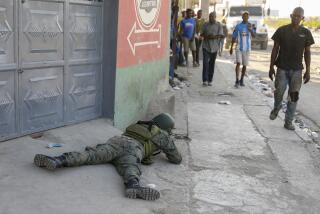CRISIS IN THE CARIBBEAN : 1,800 Marines Poised at Brink of Invasion: Then a Stand-Down : Assault ship: Commander says troops feel ‘a natural letdown.’ They were ready to secure beaches, close roads.
- Share via
ABOARD THE USS WASP OFF HAITI — The letters had been written, the machine guns loaded, the landing craft readied. This amphibious assault ship was steaming ever closer, and the captain was on the bow.
More than 1,800 young Marines were at the brink of war.
And then--peace.
Just two hours after the fighting men of the Wasp were told that they were headed for combat in Haiti, and just four hours before the helicopters were to whop off the flight deck, their commanders announced a stand-down.
These Marines would not be going in as warriors.
When Marines are trained, crammed into a ship for a month at sea, carried to Haiti and told that Raoul Cedras is the bad guy, they want to fight.
“There was a natural letdown,” said Rear Adm. William H. Wright IV, commander of the amphibious task force that was supposed to have hit the north shore of Haiti, secure the beaches, take out a heavy weapons battery and close the roads.
“You’ve got yourself prepared and you’re moving very rapidly toward an objective and then you suddenly hear there will be no ball game tonight,” the admiral said.
How prepared were they? Navy SEALS were in the waters at Cap Haitien, the Marines’ target on the northern beach of the Caribbean island. In the air, 61 planes from Pope Air Force Base in North Carolina were aloft and heading south to Haiti with paratroopers of the 82nd Airborne.
The Wasp itself was about 20 miles from shore when it was told to hold off.
“We’ve never come this close up the ramp before,” Wright said.
In the berths below, hundreds upon hundreds of Marines, their faces darkened with camouflage but enthusiasm for battle shining in their eyes, got the word just as they were being handed their ammunition.
They had not slept all day, and now they were not going to sleep at night, either. In the mildest of Marine parlance, they were upset.
Cpl. Prentis Lee Jr., 22, of Fairless Hills, Pa., felt cheated.
“This is no good,” he said. “Don’t they know the sooner we get in, the sooner we get out?”
Lance Cpl. Rian Smith, who had ridden bulls at high school rodeos in Tampa, Fla., broken his ribs and two shoulder blades and once had had a bull stomp on his head, had been just hours away from a helicopter ride into Haiti.
“We were so pumped up and ready to go,” he lamented. “Now this!”
Smith was feeling his oats, but he was also feeling fear. He had written 10 letters earlier in the day to his parents, his girlfriend and other friends. It was Sunday, and he also had attended Methodist services aboard ship.
“I prayed to the Lord that everybody got in safe,” he said. “Now we’re not even getting in.”
Navy Capt. Robert Chaplin, skipper of the Wasp, had told the Marines at 6 p.m. that H-hour would be 12:01 a.m. EDT.
“Now it is time for us to reflect,” he had said over the public address system. “Now is the time to get all of our lives in order.”
Most of the Marines did not seem to believe public opinion polls that showed a majority of Americans opposed to an invasion. And they acknowledged that the certainty that some of their own would die in an invasion.
Lt. Damon White, 26, a platoon leader from Pittsburgh, was sure there would be tragedy.
“We’re going to take casualties,” he said. “People dying, people not making it. Some Marines are not going to make it home.”
At a Catholic Mass, Father Dennis Rochefort, of Boston, led 50 Marines and sailors in song and prayer. In his sermon, the chaplain called this “Super Sunday.” His themes turned to family and friends. With several of the Marines wiping tears from their cheeks, Father Rochefort said: “You have no idea, men, of the thousands and thousands of people who are praying for you right now.”
In the mess hall at noon, Capt. Rich Diddams and his platoon leaders were reflecting on the virtue of high morale and the gut-tugging pain of anxiety.
Diddams, 32, of Jackson, N.C., would have been leading a company into his first battle. As a Marine for 10 years, a husband and father of two, and a soldier about to face action for the first time, he was well aware of the uncertainty that comes with combat.
His task would have been to lead 150 men from the beach to a weapons battery in the downtown section of Cap Haitien.
“We don’t think about policy and politics,” Diddams said. “We think about each other, the man on your right and the man on your left.”
More to Read
Sign up for Essential California
The most important California stories and recommendations in your inbox every morning.
You may occasionally receive promotional content from the Los Angeles Times.














